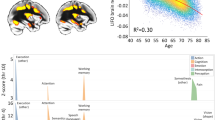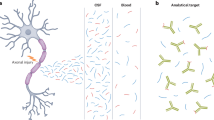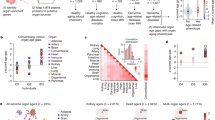Abstract
Background/Objectives:
Mild cognitive impairment (MCI), often considered as an early stage of dementia, is heterogeneous, and not all subjects with MCI progress into clinically diagnosed dementia. Low body weight (and body mass index, BMI) as well as losing weight while in MCI stadium have been proposed as possible risk factors of MCI-to-dementia conversion.
Subjects/Methods:
A prospective, 2-year observation of 102 MCI subjects has been conducted. Data on MCI subtype, somatic and neuropsychiatric co-morbidity and demographic characteristics (including age, gender and education), were collected. In addition, baseline and yearly BMI were calculated.
Results:
Data of 83 out of the originally included 102 subjects were available after 2 years; 27 of those (32.5%) progressed to dementia. In univariate analysis, multiple-deficit MCI subtype (as compared with pure amnestic), higher age, the presence of diabetes and apathy, and lower baseline BMI (and losing weight on 2-year follow-up) were associated with conversion to dementia. Variables retained in the multivariate backward stepwise logistic regression model for conversion after 24 months of observation included lower baseline BMI (odds ratio, OR (95% cofidence interval, CI): 0.6 (0.4–0.9)), weight loss on 2-year follow-up (OR (95% CI): 1.3 (1.1–1.5)), male gender (OR (95% CI): 0.1 (0.01–0.9)) and presence of apathy (OR (95% CI): 70.7 (5.6–699)). Apathetic subjects had lower BMI and higher weight loss after controlling for potential confounders (age, gender, years of education and baseline ADAS-cog (Alzheimer's Disease Assessment Scale-cognitive subscale) score).
Conclusion:
MCI subjects presenting with apathy, low initial BMI and losing weight on follow-up have a significantly greater risk of developing dementia. Nutritional and behavioural assessment should be considered as additional tools in evaluating the risk of dementia among MCI subjects.
This is a preview of subscription content, access via your institution
Access options
Subscribe to this journal
Receive 12 print issues and online access
$259.00 per year
only $21.58 per issue
Buy this article
- Purchase on Springer Link
- Instant access to full article PDF
Prices may be subject to local taxes which are calculated during checkout
Similar content being viewed by others
References
Whitmer RA, Gunderson EP, Quesenberry Jr CP, Zhou J, Yaffe K . Body mass index in midlife and risk of Alzheimer disease and vascular dementia. Curr Alzheimer Res 2007; 4: 103–109.
Fitzpatrick AL, Kuller LH, Lopez OL, Diehr P, O'Meara ES, Longstreth Jr WT et al. Midlife and late-life obesity and the risk of dementia: cardiovascular health study. Arch Neurol 2009; 66: 336–342.
Anstey KJ, Cherbuin N, Budge M, Young J . Body mass index in midlife and late-life as a risk factor for dementia: a meta-analysis of prospective studies. Obes Rev 2011; 12: e426–e437.
Johnson DK, Wilkins CH, Morris JC . Accelerated weight loss may precede diagnosis in Alzheimer disease. Arch Neurol 2006; 63: 1312–1317.
Gustafson DR, Bäckman K, Joas E, Waern M, Östling S, Guo X et al. 37 years of body mass index and dementia: observations from the prospective population study of women in Gothenburg, Sweden. J Alzheimers Dis 2012; 28: 163–171.
Buchman AS, Wilson RS, Bienias JL, Shah RC, Evans DA, Bennett DA . Change in body mass index and risk of incident Alzheimer disease. Neurology 2005; 65: 892–897.
Atti AR, Palmer K, Volpato S, Winblad B, De Ronchi D, Fratiglioni L . Late-life body mass index and dementia incidence: nine-year follow-up data from the Kungsholmen Project. J Am Geriatr Soc 2008; 56: 111–116.
Hughes TF, Borenstein AR, Schofield E, Wu Y, Larson EB . Association between late-life body mass index and dementia: The Kame Project. Neurology 2009; 72: 1741–1746.
Power BD, Alfonso H, Flicker L, Hankey GJ, Yeap BB, Almeida OP . Changes in body mass in later life and incident dementia. Int Psychogeriatr 2013; 25: 467–478.
Tolppanen AM, Ngandu T, Kåreholt I, Laatikainen T, Rusanen M, Soininen H et al. Midlife and late-life body mass index and late-life dementia: results from a prospective population-based cohort. J Alzheimers Dis 2014; 38: 201–209.
Cronk BB, Johnson DK, Burns JM . Alzheimer's Disease Neuroimaging Initiative. Body mass index and cognitive decline in mild cognitive impairment. Alzheimer Dis Assoc Disord 2010; 24: 126–130.
Besser LM, Gill DP, Monsell SE, Brenowitz W, Meranus DH, Kukull W et al. Body mass index, weight change, and clinical progression in mild cognitive impairment and Alzheimer disease. Alzheimer Dis Assoc Disord 2014; 28: 36–43.
Grundman M, Corey-Bloom J, Jernigan T, Archibald S, Thal LJ . Low body weight in Alzheimer's disease is associated with mesial temporal cortex atrophy. Neurology 1996; 46: 1585–1591.
White H, Pieper C, Schmader K, Fillenbaum G . Weight change in Alzheimer’s disease. J Am Geriatr Soc 1996; 44: 265–272.
Volicer L, Frijters DH, van der Steen JT . Apathy and weight loss in nursing home residents: longitudinal study. J Am Med Dir Assoc 2013; 14: 417–420.
Monastero R, Mangialasche F, Camarda C, Ercolani S, Camarda R . A systematic review of neuropsychiatric symptoms in mild cognitive impairment. J Alzheimers Dis 2009; 18: 11–30.
Dillon C, Serrano CM, Castro D, Leguizamon PP, Heisecke SL, Taragano FE . Behavioral symptoms related to cognitive impairment. Neuropsychiatr Dis Treat 2013; 9: 1443–1455.
Albert MS, DeKosky ST, Dickson D, Dubois B, Feldman HH, Fox NC et al. The diagnosis of mild cognitive impairment due to Alzheimer's disease: recommendations from the National Institute on Aging-Alzheimer's Association workgroups on diagnostic guidelines for Alzheimer's disease. Alzheimers Dement 2011; 7: 270–279.
Morris JC . The Clinical Dementia Rating (CDR): current version and scoring rules. Neurology 1993; 43: 2412–2414.
Hughes CP, Berg L, Danziger WL, Coben LA, Martin RL . A new clinical scale for the staging of dementia. Br J Psychiatry 1982; 140: 566–572.
Rosen WG, Mohs RC, Davis KL . A new rating scale for Alzheimer's disease. Am J Psychiatry 1984; 141: 1356–1364.
Folstein MF, Folstein SE, McHugh PR . Mini-mental-state: a practical method for grading the cognitive state of patients for the clinician. J Psychiatr Res 1975; 12: 189–198.
Reitan RM . The relation of the trail making test to organic brain damage. J Consult Psychol 1955; 19: 393–394.
Kaplan EF, Goodglass H, Weintraub S . The Boston Naming Test: Experimental edition (1978). Boston, USA: Kaplan & Goodglass, 1978, 1983.
Lezak MD, Howieson DB, Loring DW . Neuropsychological Assessment. 4th edn. Oxford University Press, USA: New York, 2004.
Corwin J, Bylsma FW . Translations of excerpts from the Andre Rey's Psychological examination of traumatic encephalopathy and P.A. Osterreith's The complex figure copy test. Clin Neuropsychol 1993; 7: 3–15.
Wechsler D . Wechsler Adult Intelligence Scale—Revised. The Psychological Corporation, USA: New York, 1981.
Cummings JL, Mega M, Gray K, Rosenberg-Thompson S, Carusi DA, Gornbein J . The Neuropsychiatric Inventory: comprehensive assessment of psychopathology in dementia. Neurology 1994; 44: 2308–2314.
Sergi G, De Rui M, Coin A, Inelmen EM, Manzato E . Weight loss and Alzheimer's disease: temporal and aetiologic connections. Proc Nutr Soc 2013; 72: 160–165.
Barrett-Connor E, Edelstein SL, Corey-Bloom J, Wiederholt WC . Weight loss precedes dementia in community-dwelling older adults. J Am Geriatr Soc 1996; 44: 1147–1152.
Knopman DS, Edland SD, Cha RH, Petersen RC, Rocca WA . Incident dementia in women is preceded by weight loss by at least a decade. Neurology 2007; 69: 739–746.
Nourhashémi F, Deschamps V, Larrieu S, Letenneur L, Dartigues JF, Barberger-Gateau P . PAQUID study. Personnes Agées Quid. Body mass index and incidence of dementia: the PAQUID study. Neurology 2003; 60: 117–119.
Fadel JR, Jolivalt CG, Reagan LP . Food for thought: the role of appetitive peptides in age-related cognitive decline. Ageing Res Rev 2013; 12: 764–776.
Guerin O, Soto ME, Brocker P, Robert PH, Benoit M, Vellas B . REAL.FR Group. Nutritional status assessment during Alzheimer's disease: results after one year (the REAL French Study Group). J Nutr Health Aging 2005; 9: 81–84.
Benoit M, Berrut G, Douissant J, Bakchine S, Bonin-Guillaume S, Fremont P et al. Apathy and depression in mild Alzheimer's disease: a cross-sectional study using diagnostic criteria. J Alzheimers Dis 2012; 31: 325–334.
Sobow T, Magierski R, Flirski M, Wojtera M, Kloszewska I . Apathy but not other affective symptoms is predicting conversion to dementia in mild cognitive impairment. Alzheimers Dementia 2010; 6: S355.
Richard E, Schmand B, Eikelenboom P, Yang SC, Lightart SA, Moll van Charante EP et al. Symptoms of apathy are associated with progression from mild cognitive impairment to Alzheimer's disease in non-depressed subjects. Dement Geriatr Cogn Disord 2012; 33c: 204–209.
Somme J, Fernandez-Martinez M, Molano A, Zarranz JJ . Neuropsychiatric symptoms in amnestic mild cognitive impairment: increased risk and faster progression to dementia. Curr Alzheimer Res 2013; 10: 86–94.
Seligman SC, Kamath V, Giovanetti T, Arnold SE, Moberg PJ . Olfaction and apathy in Alzheimer's disease, mild cognitive impairment, and healthy older adults. Aging Mental Health 2013; 17: 564–570.
Barberger-Gateau P, Lambert JC, Feart C, Peres K, Ritchie K, Dartigues JF et al. From genetics to dietetics: the contribution of epidemiology to understanding Alzheimer's disease. J Alzheimers Dis 2013; 33: S457–S463.
West NA, Haan MN . Body adiposity in late life and risk of dementia or cognitive impairment in a longitudinal community-based study. J Gerontol A Biol Sci Med Sci 2009; 64: 10 3–109.
Acknowledgements
The authors are (partially) supported by Healthy Ageing Research Centre (REGPOT-2012-2013-1, 7FP). The work was supported by own resources of Medical University of Lodz (503/8-040-01/503-01).
Author information
Authors and Affiliations
Corresponding author
Ethics declarations
Competing interests
The authors declare no conflict of interest.
Rights and permissions
About this article
Cite this article
Sobów, T., Fendler, W. & Magierski, R. Body mass index and mild cognitive impairment-to-dementia progression in 24 months: a prospective study. Eur J Clin Nutr 68, 1216–1219 (2014). https://doi.org/10.1038/ejcn.2014.167
Received:
Accepted:
Published:
Issue Date:
DOI: https://doi.org/10.1038/ejcn.2014.167
This article is cited by
-
Age and sex-specific associations between depressive symptoms, body mass index and cognitive functioning among Korean middle-aged and older adults: a cross-sectional analysis
BMC Geriatrics (2022)
-
Cognitive trajectories preluding the imminent onset of Alzheimer’s disease dementia in individuals with normal cognition: results from the HELIAD cohort
Aging Clinical and Experimental Research (2022)
-
Relationship between tooth loss, low masticatory ability, and nutritional indices in the elderly: a cross-sectional study
BMC Oral Health (2019)
-
Weight Loss in Patients with Dementia: Considering the Potential Impact of Pharmacotherapy
Drugs & Aging (2017)



